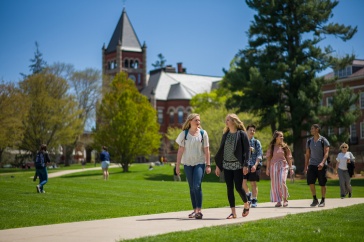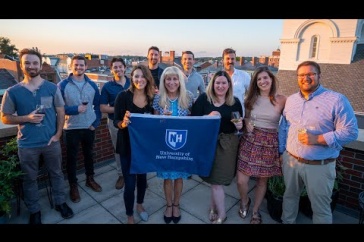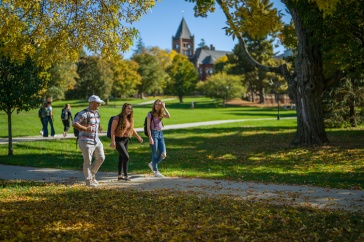
For many who frequented Dimond Library in the past few decades, the short balding man who stood outside the entrance — always smoking a pipe, dressed in a ragged sweater vest and blazer, and pacing — was a curious and familiar figure. Some wondered if he was a homeless person. Others knew his name, however, or that he was an alumnus, or that he had worked as a library cataloguer for the last half-century. But no one suspected that this hunched, bespectacled man — Robert “Bob” Morin '63 — was quietly amassing a $4 million estate that he would leave to UNH after his death in March 2015 at age 77.
It's a Small World
Within the Dimond Library community, many people saw Morin daily — in the staff lounge, where he grabbed Fritos and a Coke for breakfast every morning, or when he stopped by the circulation or reference desks, pipe in hand, to joke with staff or sing a little song on his way out for a smoke.
Despite his solitary role, Morin had many acquaintances, mostly women, who liked and cared about him. Library services technician Sarah Stinson met Morin on her first day of work in July 2006, when he appeared at the circulation desk, leaned in and growled, “Who are you?”
“I shot back, ‘Who are you?’ and we struck up this quirky friendship,” Stinson recalls. She began inviting Morin to lunch and for outings on campus. She would pepper Morin with questions and discovered he was a great conversationalist with a keen intellect and astounding retention rate.
“I loved talking to him. He knew a lot about music and history and had all kinds of facts and data on hand. He could speak to almost any topic,” she says. “He was willing to be silly and funny, and he told these ridiculous and absurd canned jokes, but he was also really intellectual.”
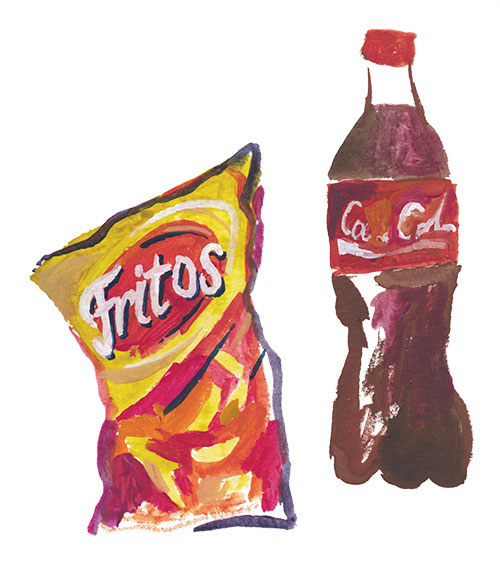
Morin seemed like a well-traveled person because he was so well read, but Stinson was stunned to learn how few places he’d been to on campus — even as a student — and that he’d taken just one road trip and one flight in his life. Morin went from point A to point B, she says, and limited travel to his daily commute between his home in Dover and UNH.
By choice Morin lived alone and simply, with no apparent need of creature comforts or visitors. He warmed up frozen dinners in a microwave every night and hadn’t been to see a doctor or dentist, or bought new clothing, in decades.
Stinson found that people reacted to Morin by either keeping their distance from or adopting him. “For me and a few others, there was a sense of protectiveness for Bob. He was just very innocent and not good at the practical things that life requires of you,” she says, “but in other ways he was a total Zen master.”
In time, Stinson learned how Morin spent his hours outside of work. From 1979 to 1997 he had watched an average of four films a night — an obsession that ended abruptly when his television broke. By that time he had seen some 22,000 videos. Rather than repair or buy a new TV, he launched another epic project, setting out to read, in chronological order, every book published in the U.S. from 1930 to 1940, excluding children’s books, textbooks and books about cooking and technology. It was a project that required hundreds, if not thousands, of interlibrary loans and continued until his death, at which point he had reached 1938, the year of his birth.
Past is Prologue
Morin was born in Nashua, N.H., in January 1938 to French-Canadian parents who worked in the mills and never owned a car or their own home. He was afflicted with a spinal curvature at birth that would make him appear smaller than his full adult height of 5’3” and with a club foot that noticeably affected his gait.
The eldest of three brothers, Morin attended Nashua schools and was the only son to attend college. He was described in his high school yearbook as an “excellent student” with “tremendous French pronunciation” and a “gigantic stamp collection.”
As a graduation present, Morin’s parents gave him a record player, and he soon bought a classical music album that began his lifelong passion for the genre. After he left for college, his parents divorced, and he became estranged from his father and brothers.
Morin attended UNH from 1955 to 1963, with a major in English. He supported himself and had to interrupt his studies repeatedly to work in Nashua mills and earn more money for college expenses. Eventually, he found a part-time job at Dimond Library that he enjoyed so much he went on to earn a master’s degree in library science at Simmons College. In 1965 Morin returned to the library for a full-time job as a cataloguer, which suited him so well that he never intended to retire.

On the day before her own retirement from a 51-year career at UNH, reference librarian Debbie Watson ’63 spoke of her early days, in the mid-1960s, when she worked alongside Morin as a cataloguer. They spent their days examining and recording the descriptions and codes of new media, mostly books back then, on tiny catalog cards.
“Our whole purpose was to make these resources accessible to the public,” Watson says. “Bob was excellent at it. He was detail oriented and had broad general knowledge, which is essential for that job.”
Watson was one of the few who perhaps had an inkling of the fortune Morin would eventually leave the university.
“Bob was one of the most frugal people I’ve ever known. I was flummoxed one day when I saw he had a whole drawer full of uncashed paychecks,” she says. “He didn’t need money. He never bought anything!”
A Joy To Work With
Bethany Wakeman Henry ’10 met Morin while a work-study student in the library’s technology services. Morin worked with special acquisitions, and anything unusual or difficult to catalogue — whether films, foreign books, music or musical scores — landed on his desk. He would tell Henry about the fascinating foreign literature he was recording or read her the news from 100-year-old newspapers.
“Working with Bob was a joy,” Henry says. “He’d make up nicknames for me by mispronouncing my name, and I’d get him to laugh by creating ridiculous puns. Every conversation could go in any direction. Bob’s mind was as sharp as they come, but he saw no need to concern himself with politics or making changes in his life or worrying about the future.”
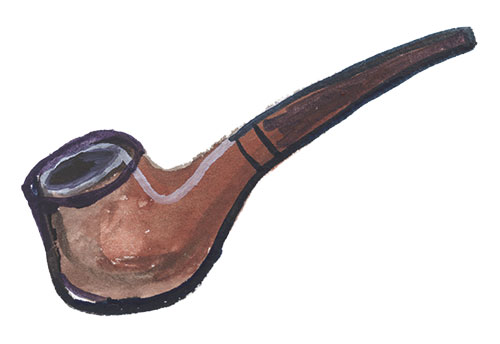
On a whim one day, Henry asked Morin if she could take him shopping for new clothes. She knew he didn’t like to drive to new places. Before long they were wandering around the men’s department at Macy’s, picking out clothes with the help of a salesperson.
“I was a bit of a bully,” Henry admits. “Bob kept saying, ‘That should do it!’ but I’d tell him he probably needed more shirts and a tie.”
Although Morin spent several hundred dollars on a suit, fancy shirts and ties and a plush bathrobe, he continued to appear in his threadbare, mismatched outfits at work until Henry gave him a reason to put on his new suit: She began inviting him to join her family for holiday dinners. Through her student years and beyond, Henry would pick Morin up and bring him to her family home for Easter, Thanksgiving and Christmas. He would settle in at their table, often next to Henry’s grandfather, and add his jokes and trivia to the family banter.
“I believe he enjoyed being pulled into the family,” Henry says. “He even braved driving to a new place to attend my wedding. After my daughter was born, he became an expert in baby-language.”
The Unlikely Millionaire
Ed Mullen ’62 was an insurance agent for MassMutual Financial Group when he first met Morin in 1971. At the time Morin owned a small life insurance policy with MassMutual for the benefit of his mother. Morin was then earning $9,000 a year.
A Rare Gift
Robert Morin’s $4-million mostly unrestricted bequest enables UNH President Mark Huddleston to respond to the university’s highest current priorities.
The majority of Morin’s gift, $2.5 million, will help to launch an expanded and centrally located career center for UNH students and alumni. Hood House, the center’s current location, will be completely renovated to accommodate new staff members and expand programs and services.
Another $1 million of Morin’s gift will support the new electronic video scoreboard for the new UNH Wildcat Stadium.
The $100,000 gift that Morin dedicated to Dimond Library will provide scholarships for work-study students and support staff who continue their studies in library science. This gift will also be used to renovate and upgrade the technology of one of the library’s multimedia rooms.
“Unrestricted gifts give the university the ability to use the funds for our highest priorities and emerging opportunities,” says Debbie Dutton, president of the UNH Foundation. “This is an extraordinary gift that comes at a critical time for launching a number of initiatives that are only able to move forward because of Bob’s generosity.”
Theresa Curry, senior director of gift planning for the UNH Foundation, says Morin’s gift is highly unusual, both because he was so frugal and made smart investments and because he chose to leave so much of it unrestricted.
Morin’s gift, like he himself, is one of a kind.
“Bob was proud that he could make such an extraordinary gift,” Curry says, “as he should be.”
In his role as a financial advisor, Mullen became more involved with Morin over the years and learned that he had accumulated substantial amounts of money in his checking account, low-interest CDs and savings. (At one point, Morin had more than $100,000 in his checking account.) Mullen advised him to put his money in more diversified investments and in other insurance and annuity products to improve his rate of return.
“Bob didn’t spend much money on himself and drove an old Plymouth, and when that died, he bought a Honda Civic with over 100,000 miles,” Mullen says.
When Morin’s mother died in 2004, he told Mullen that he wished to make the university the sole beneficiary of his estate. Mullen introduced to him to an attorney who helped him create his will. Over his career, Morin invested much of his salary and purchased a generous life insurance policy for the benefit of the university. He was able to maximize his salary contributions to his retirement account, which combined with the university’s contributions, was worth approximately $1.5 million at the time of his death.
“Bob was adamant that he did not want to designate where the money would be spent,” Mullen says, “although he did dedicate $100,000 to the library where he worked for so many years.”
On a snowy morning in January 2014, colleagues arrived at UNH to find Morin slumped over his desk, still wearing his winter coat. Stinson helped him to get home, and the next day she took him to his doctor, who directed the pair to the emergency room at Wentworth-Douglass Hospital in Dover. Tests revealed colon cancer, complicated by severe anemia and dehydration. Morin soon had surgery to remove a tumor, but remained too sick to ever return home or to work.
Morin moved to Spruce Woods, a local assisted-living center, where he soon charmed the nurses with his sense of humor and positive spirit. At times he seemed overwhelmed by his sudden immersion in the medical world, but Stinson says he never complained and was “all in” for chemotherapy.
During his 15 months at Spruce Woods, Morin was visited by his library colleagues and found time for one more epic project. He started watching football games on TV and mastered the rules and names of the players and teams. As was his way, Morin made a study of it and didn’t root for any particular team.
“Bob was totally accepting of what was happening to him. He never complained,” Stinson says. “His health declined quickly, but he flirted with every nurse he crossed paths with and was joking up to the very end.”
In Morin’s final days Stinson found it hard to see him so weak and vulnerable. She asked him how he felt, as she often had in the past, and only then did he give her an answer: “You can get used to anything, kid.”
Despite his brilliant mind, Morin chose to live a spartan and solitary life, detached from his family and his past. Yet he loved his job and the library environment he worked in and enjoyed his rituals of daily banter with his colleagues.
The select few Morin counted as his friends embraced his eccentricities and pushed through his boundaries to know him better. In return, they gained access to some of the hidden landscapes of his mind, where he was confident, well-travelled and content. They felt privileged to be his friends.
Morin never told anyone why he chose to leave his entire estate to UNH, but perhaps his final gift was his way of expressing gratitude for an education and career that cultivated his passion for learning and connected him to a place he was proud of and people who cared about him.
“I miss Bob,” Stinson says. “He was a true original.”
Originally published in UNH Magazine Fall 2016 Issue
Comment on this article.
-
Written By:
Kimberly Swick Slover | UNH Magazine
















































